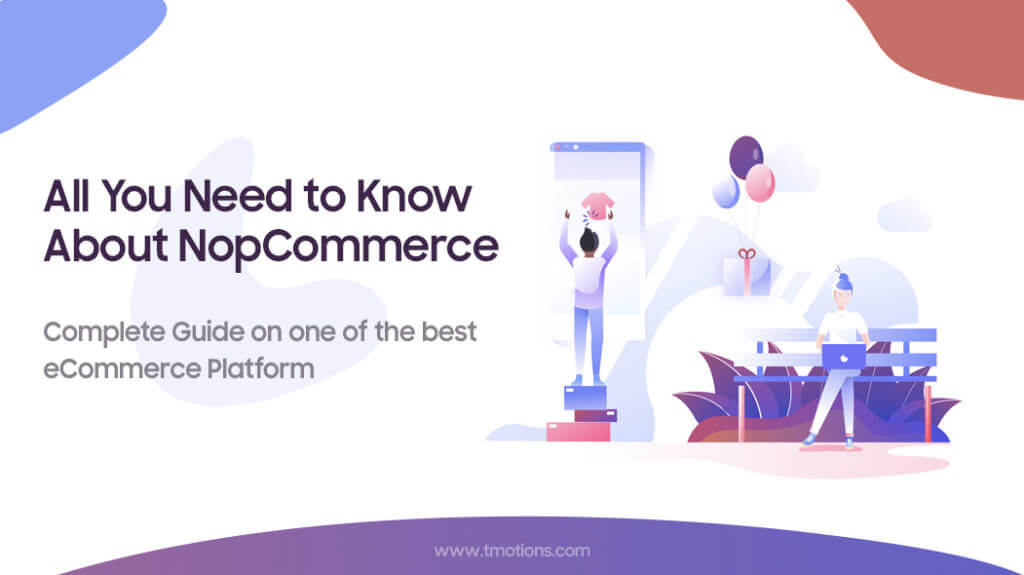Welcome to our blog series on securing your retail business with nopCommerce! In today’s digital age, where online transactions have become the norm, ensuring the security of your retail operations is more critical than ever. As businesses increasingly rely on e-commerce platforms to reach customers and drive sales, the need to safeguard sensitive data and protect against cyber threats has become paramount.
In this series, we’ll explore how nopCommerce, a robust and versatile e-commerce platform, can serve as a powerful ally in fortifying your retail business against security risks.
Importance of Security in Retail Businesses
Security lies at the heart of every successful retail operation. Retailers handle a wealth of sensitive information, including customer payment details, personal data, and proprietary business information. Any breach or compromise in security not only jeopardizes the trust and confidence of customers but also exposes the business to significant financial and reputational damage.
Cybercriminals are constantly evolving their tactics, seeking to exploit vulnerabilities in retail systems and networks. From data breaches and malware attacks to phishing scams and ransomware, the threat landscape facing retail businesses is diverse and ever-changing. In such a challenging environment, prioritizing security isn’t just a best practice—it’s a business imperative.
Implementing robust security measures not only helps safeguard sensitive data but also instills trust and confidence in your customers. When customers feel secure shopping on your platform, they’re more likely to return for future purchases and recommend your brand to others. Additionally, by proactively addressing security risks, retailers can mitigate potential liabilities and regulatory compliance issues, thereby protecting their bottom line and preserving their reputation.
Navigating the Dynamic Pricing Landscape | Drupal Commerce vs Magento
NopCommerce as a Platform for Retail Businesses
NopCommerce emerges as a powerful ally for businesses aiming to thrive in the digital realm. As an open-source e-commerce platform, NopCommerce offers a comprehensive suite of features tailored to meet the diverse needs of retail businesses, empowering them to create engaging online stores and drive sales growth. Here’s why NopCommerce stands out as a preferred choice for retail ventures:
-
-
Flexibility and Customization:
NopCommerce provides extensive customization options, allowing retailers to tailor their online stores according to their brand identity and specific requirements. From customizable themes to flexible product catalogs, retailers have the freedom to create unique shopping experiences for their customers.
-
User-friendly Interface:
NopCommerce boasts an intuitive and user-friendly interface, making it easy for retailers to manage their online stores efficiently. From product management to order processing, the platform streamlines various administrative tasks, allowing retailers to focus on enhancing the customer experience.
-
Powerful Marketing Tools:
NopCommerce equips retailers with powerful marketing tools to attract and retain customers. From built-in SEO features to advanced analytics and reporting capabilities, retailers can optimize their online presence, target their audience more effectively, and measure the performance of their marketing campaigns.
-

Common Security Threats Faced by Retail Businesses
Nowadays, Retail businesses face a multitude of security threats that can compromise their sensitive data, disrupt operations, and damage their reputation. Understanding these threats is crucial for implementing effective security measures to safeguard against potential risks. Here are some of the most common security threats faced by retail businesses:
-
-
Payment Card Fraud:
Payment card fraud, including credit card and debit card fraud, is a significant concern for retail businesses. Cybercriminals may use various techniques such as card skimming, phishing, or exploiting vulnerabilities in payment systems to steal cardholder data and make unauthorized transactions.
-
Data Breaches:
Data breaches occur when unauthorized individuals gain access to sensitive customer information such as personal details, payment card data, or login credentials. These breaches can occur through malware attacks, insider threats, or vulnerabilities in software systems, leading to severe financial and reputational damage for retail businesses.
-
Point-of-Sale (POS) Attacks:
Point-of-sale systems, used for processing transactions in retail stores, are vulnerable to attacks by cybercriminals seeking to steal payment card data or install malware for financial gain. POS attacks may exploit weaknesses in software security, unauthorized access to POS terminals, or insider threats within the organization.
-
Website and Application Vulnerabilities:
Retail websites and e-commerce applications are prime targets for cyberattacks due to their exposure to the internet and the sensitive data they handle. Vulnerabilities such as SQL injection, cross-site scripting (XSS), or insecure authentication mechanisms can be exploited by attackers to compromise customer data or gain unauthorized access to systems.
-
Leveraging the Metaverse for Business Success | NopCommerce vs Magento
Data Encryption and Secure Payment Processing
Implementing robust encryption protocols and adhering to industry standards for payment security are essential components of a secure e-commerce environment. Here’s an overview of data encryption and secure payment processing in e-commerce:
Data Encryption:
-
-
- SSL/TLS Encryption: Secure Sockets Layer (SSL) and its successor, Transport Layer Security (TLS), are cryptographic protocols that encrypt data transmitted between a web server and a user’s browser. SSL/TLS encryption ensures that sensitive information, such as personal details, login credentials, and payment card data, remains confidential and protected from interception by malicious actors.
-
End-to-End Encryption (E2EE):
End-to-End Encryption (E2EE) ensures that data is encrypted throughout its entire transmission path, from the sender to the recipient, preventing unauthorized access at any intermediate points. E2EE is crucial for securing sensitive communications and transactions in e-commerce, particularly in scenarios involving sensitive customer data.
-
Secure Payment Processing:
-
-
-
PCI DSS Compliance:
Payment Card Industry Data Security Standard (PCI DSS) compliance is a set of security standards established to ensure the secure processing, storage, and transmission of payment card data. Adhering to PCI DSS requirements is mandatory for e-commerce merchants handling payment card transactions to mitigate the risk of data breaches and fraud.
-
Tokenization:
Tokenization replaces sensitive payment card data with unique tokens during transaction processing. These tokens are meaningless to attackers and can only be decrypted by the payment processor, reducing the risk associated with storing and transmitting payment card information within e-commerce systems.
-
Secure Payment Gateways:
Secure Payment Gateways facilitate the secure transmission of payment data between the customer, merchant, and payment processor. These gateways employ encryption protocols, such as SSL/TLS, to protect payment information during transmission, ensuring confidentiality and integrity throughout the payment process.
-
-
User authentication and access control best practices
User authentication and access control are critical components of ensuring the security and integrity of systems, applications, and data. By implementing best practices in user authentication and access control, organizations can mitigate the risk of unauthorized access, data breaches, and other security incidents. Here are some key best practices to consider:
-
-
Strong Password Policies:
Enforce strong password policies that require users to create complex passwords containing a combination of letters, numbers, and special characters. Encourage regular password updates and discourage the reuse of passwords across multiple accounts.
-
Multi-Factor Authentication (MFA):
Implement multi-factor authentication (MFA) to add an extra layer of security beyond passwords. MFA requires users to provide additional verification factors, such as a one-time code sent to their mobile device or biometric authentication, before gaining access to the system.
-
Role-Based Access Control (RBAC):
Implement role-based access control (RBAC) to manage user permissions and access rights based on predefined roles and responsibilities. Assign users to appropriate roles with specific permissions that align with their job functions. Ensuring that they have access only to the resources and data necessary to perform their duties.
-
Third-Party Security Integrations Compatible with nopCommerce
NopCommerce, as a robust and customizable e-commerce platform, offers compatibility with a variety of third-party security integrations to enhance the security posture of online stores. These integrations provide additional layers of protection against various security threats and vulnerabilities, ensuring the integrity, confidentiality, and availability of sensitive data.
Here are some third-party security integrations compatible with nopCommerce:
-
-
Web Application Firewalls (WAFs):
Third-party WAF solutions such as Cloudflare, Sucuri, and AWS WAF offer protection against common web application attacks such as SQL injection, cross-site scripting (XSS), and distributed denial-of-service (DDoS) attacks. Integrating a WAF with nopCommerce helps mitigate the risk of unauthorized access and data breaches.
-
Security Information and Event Management (SIEM) Systems:
SIEM solutions like Splunk, LogRhythm, and IBM QRadar collect and analyze security event data from various sources within the IT infrastructure, including web servers, databases, and network devices. Integrating nopCommerce with a SIEM system enables centralized monitoring, correlation, and analysis of security events to detect and respond to potential threats in real-time.
-

Ensuring Robust Security in Client nopCommerce Projects: Our Comprehensive Approach
In our client nopCommerce projects, we prioritize security at every stage of development to ensure the integrity, confidentiality, and availability of sensitive data and resources.
Here’s an overview of what we do for security purposes in our client nopCommerce projects:
-
-
Risk Assessment and Planning:
We conduct a comprehensive risk assessment to identify potential security threats, vulnerabilities, and compliance requirements specific to the client’s business and industry. Based on the assessment, we develop a security plan outlining the necessary measures to mitigate risks and ensure regulatory compliance.
-
Secure Development Practices:
We adhere to secure coding practices and guidelines recommended by industry standards such as OWASP (Open Web Application Security Project) to minimize the risk of common security vulnerabilities such as SQL injection, cross-site scripting (XSS), and insecure direct object references (IDOR). Our development team undergoes regular training to stay updated on the latest security best practices and techniques.
-
Authentication and Access Control:
We implement strong authentication mechanisms, such as multi-factor authentication (MFA) and password policies, to verify the identity of users accessing nopCommerce admin panels and sensitive areas of the platform. Role-based access control (RBAC) is enforced to ensure that users have appropriate permissions based on their roles and responsibilities.
-
Data Encryption:
We employ encryption protocols such as SSL/TLS to encrypt data transmitted between nopCommerce servers and user devices. We protecting sensitive information from interception by unauthorized parties. Additionally, we implement data-at-rest encryption to secure data stored on servers or databases, further safeguarding against unauthorized access.
-
By implementing these security measures and best practices in our client nopCommerce projects, we strive to provide a secure and resilient e-commerce environment that instills trust and confidence among users while protecting valuable assets and sensitive data from potential security threats and attacks.
How Early Adopters of Generative AI Are Winning with Personalization
Conclusion
Nowadays, security is important, especially in e-commerce ventures utilizing platforms like nopCommerce. Throughout this discourse, we’ve underscored the critical importance of integrating robust security measures into client nopCommerce projects.
Moving forward, we remain steadfast in our commitment to delivering secure, reliable, and innovative solutions that empower clients to thrive in the digital realm while safeguarding their interests and reputation. With security as our guiding principle, we embark on a journey of collaboration, innovation, and excellence, ensuring the success and prosperity of client nopCommerce projects for years to come.
Feel free to share your thoughts with us; we value your insights!














